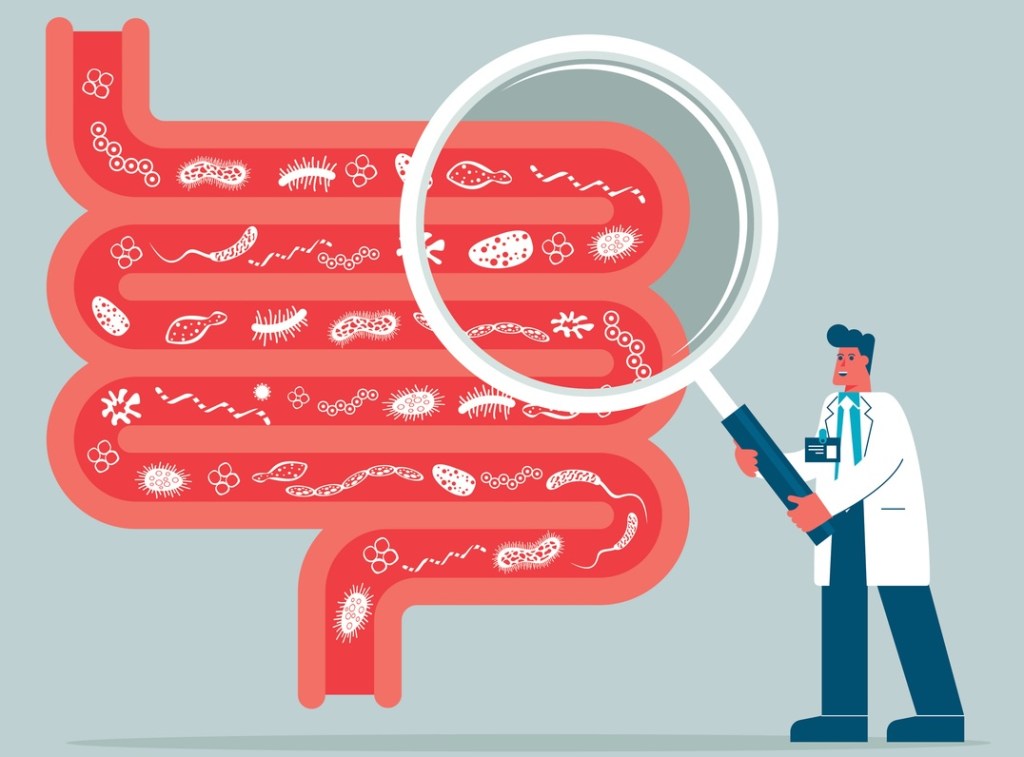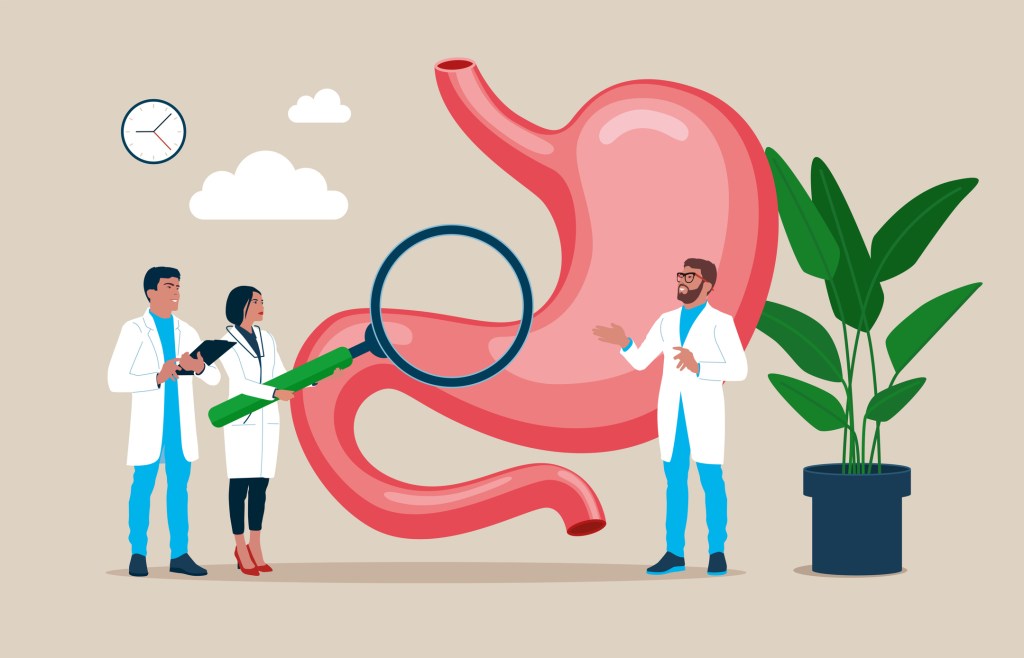From tummy gummies and digestive drops to de-bloating tips and tricks, your intestines have become the latest wellness frontier in recent years. Due to increased awareness via social media, a ballooning market of pre- and probiotics, and, unfortunately, more cases of gastrointestinal diseases, digestive health is having a moment. The gastrointestinal system, long considered boring, gross, or even taboo, is seemingly now a worldwide fascination — and for good reason.
A 2023 study found that digestive diseases have been on the rise since 1990, with an estimated 60 million to 70 million Americans experiencing a digestive disease of some sort. In 2021, 8.4 million people went to the emergency room because of one. Additionally, there’s increasing research about the behavior of the gut and how it affects other parts of the body.
Gut health is no longer a topic reserved for people with digestive disorders and their doctors: A McKinsey survey published in May found that over 80% of consumers in the U.S., U.K., and China consider gut health to be important, and over 50% plan on prioritizing it over the next few years.
Furthermore, market research firm SNS Insider valued the global market for digestive health supplements at $51.65 billion in 2023 and expects it to reach $111.96 billion by 2032. But you don’t have to purchase an arsenal of fancy pills to take control of your gut health.
What’s in Your Gut
One of the most important things to understand about your gut is that it’s an ecosystem within your body. Your gastrointestinal tract is a 30-foot-long superhighway, home to trillions of microorganisms that help you digest your food. Most of these are bacteria, feeding on the nutrients you ingest and providing services to your body in return.

It might make you a little uneasy to think that your body is home to so many microscopic species, but they’re just as crucial to your survival as you are to theirs. Anything you eat has a long road from mouth to excretion, and your gut microbiome helps keep things moving with as few hiccups as possible.
To throw a good party, it helps to have a guest list full of diverse, interesting people to keep the atmosphere stimulating. It’s not so different in your digestive system: According to Verywell Health, your intestines’ resilience depends on both the amounts of gut flora that live there and the vast number of different species represented.
A “healthy” digestive system relies on this bacterial balance, and you tend to experience negative symptoms like stomach pain, indigestion, and diarrhea when an external factor throws your gut out of balance — known as dysbiosis. Have you ever felt queasy after taking an antibiotic? That’s because the medication killed the good bacteria that helped keep your gut healthy in addition to whatever bad bacteria it was targeting.
Why Gut Health Is Important
Recent research has found that your microbiome might help with more than just breaking down the food you eat. Dr. Alexander Khoruts, a gastroenterologist and researcher of microbiota therapeutics at the University of Minnesota, says the gut (and the flora that call it home) plays a role in the rest of the body as well — notably metabolism, immune function, and mental health.
“The gut is the biggest immune organ in the body,” Khoruts told Nice News. “It also has its own nervous system, which interacts closely with our central nervous system. It also contains the gut microbiome, which is a big metabolic organ in its own right (second only to the liver). Approximately 10% of all chemicals circulating in the bloodstream are products of the gut microbiome.”
This means that the bacteria in our intestines may impact how we respond to infections as well as our risk for chronic conditions like diabetes and obesity. Emerging research also suggests a connection between a balanced microbiome and healthy skin. And some scientists are finding that the gut’s dedicated nervous system can affect (and be affected) by the brain. According to Johns Hopkins Medicine, these nerves can cause people experiencing IBS and other chronic digestive conditions to also experience mental health issues like anxiety and depression — and vice versa. What we eat could have a greater effect on how we feel than previously thought.
How to Keep Your Gut Healthy
Khoruts says there’s no scientific consensus on how exactly to measure gut health, and there are no clinical tests for it. However, symptoms to look out for include blood in your stool, changes in the frequency or consistency of your stool, and sudden unintentional weight loss. Check out this handy guide to see how your bowel movements measure up.

As is true for almost any other area of the body, there’s no magic pill that will make or keep your microbiome healthy. Despite the proliferation of digestive supplements, medical professionals warn against looking to them as cure-alls for gut problems. The American Gastroenterological Association does not recommend the use of probiotics to treat most digestive conditions, and Khoruts says one of the biggest misconceptions about digestive health is that it can be improved by products marketed by the supplement industry.
“None of these products are based on scientific evidence,” Khoruts explained. “I generally recommend patients to focus on their diet, which should contain diverse sources of fiber.”
Fiber is a prebiotic that doesn’t actually get absorbed into the bloodstream, which means it’s primarily food for your gut microbiome. Feeding those organisms in turn helps them (and you) digest more efficiently. In addition to supporting regular, healthier bowel movements, fiber is also linked to reduced cholesterol, blood pressure, and inflammation.
It’s also crucial to drink more water as you consume more fiber, and to increase your fiber intake gradually if you’re deficient — too much at once can lead to gas and bloating. Verywell Health recommends reducing the intake of certain processed foods that remove much of the fiber from their ingredients.
Probiotics — which package notable bacteria believed to contribute to a healthy microbiome in the forms of pills or gummies — are another wellness flashpoint, but Khoruts says many of the claims about these supplements can be pseudoscientific. Most gut supplements aren’t clinically evaluated by the FDA, so researchers largely don’t know which are helpful and which aren’t. And because everyone’s microbiome is different, the types of probiotics you specifically need and how much you should take aren’t easily known.
@myhealthydish How to make homemade Dill Pickles #pickling #homemadefood #healthyrecipe
♬ Colombia, Mi Encanto – Instrumental – Lin-Manuel Miranda
Instead, Khoruts and other gastroenterologists also recommend fermented foods like kefir, kombucha, kimchi, pickles, miso, and sauerkraut, which naturally provide these probiotic bacteria. These foods have existed in many cultures for centuries to keep people healthy, and you can find more information about them here.
“At least these products are based on natural ways to preserve the nutritional value of foods,” Khoruts said, “and they may contain products of fermentation that are beneficial for gut health.”
RELATED: A Stomach Full: How This Tiny Ingestible Sensor Could Help Doctors Identify GI Issues












